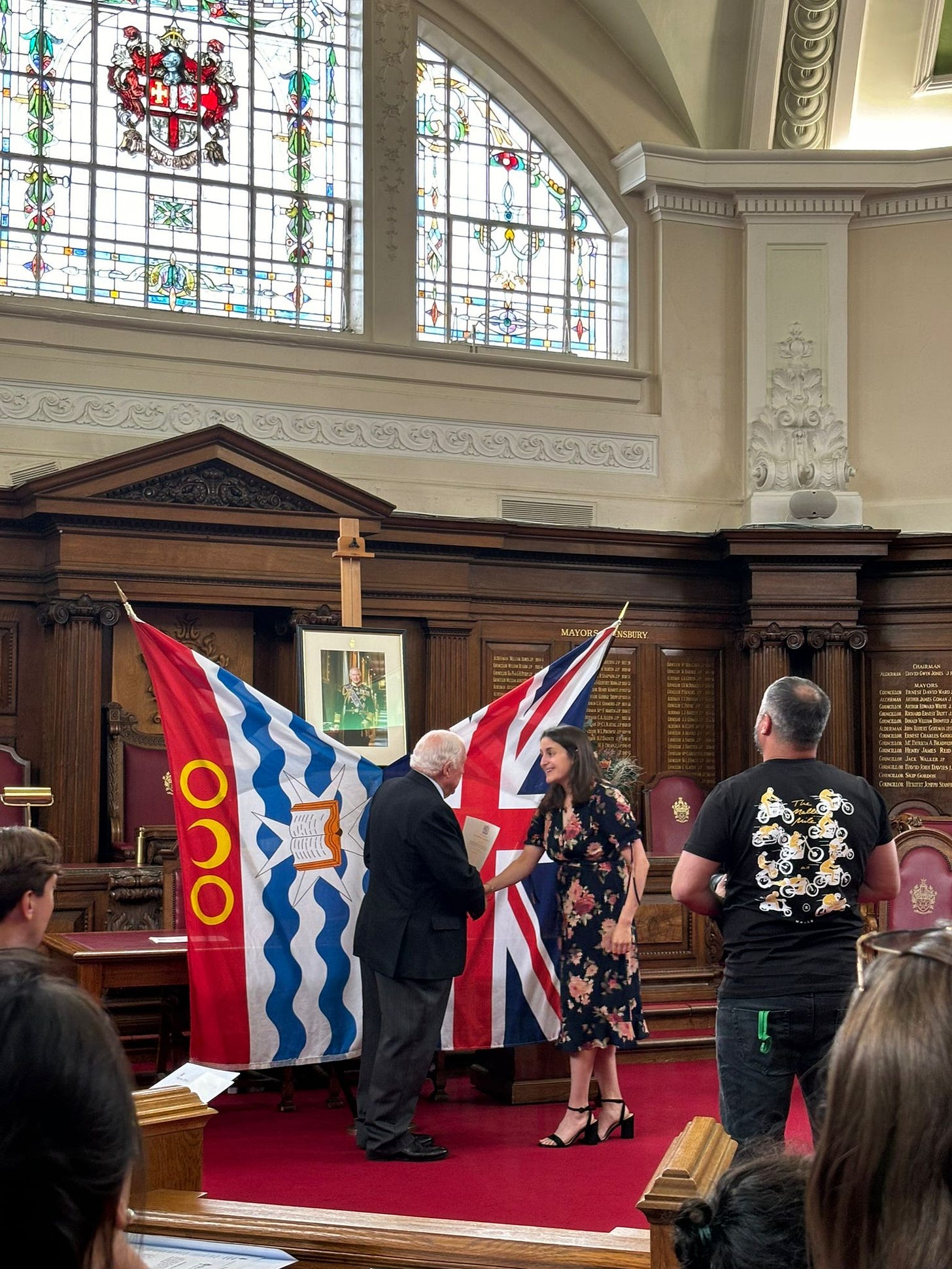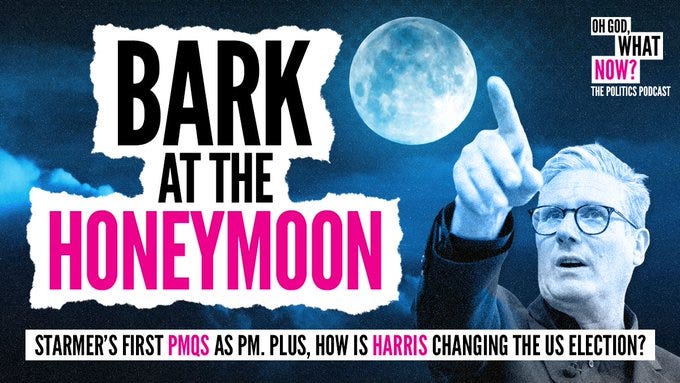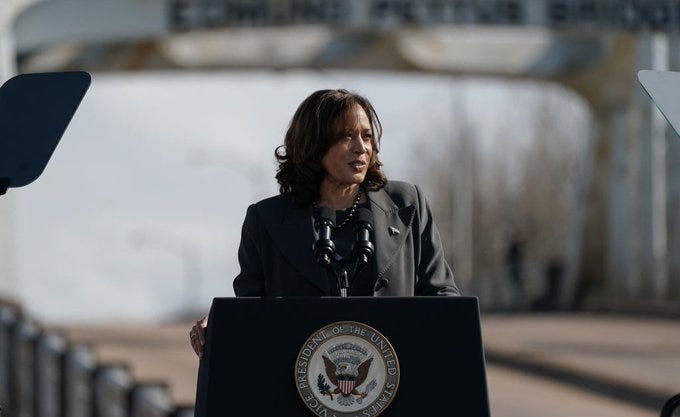Hello, and happy Friday!
After six years, 10 months, and 16 days living as an American in London, I decided to take my relationship with the U.K. to the next level. On Monday, I became a British citizen.
Although my path to British citizenship was relatively straightforward—I spent five years on a work visa before becoming eligible to apply for indefinite leave to remain and, a year later, naturalization—it nearly wasn’t. I distinctly remember sitting at my desk in The Atlantic’s newsroom in Washington, D.C. in the summer of 2017 when my editor at the time asked me if I preferred a work visa that would put me on a path to citizenship. “No, that’s alright,” I replied, not giving the idea so much as a second thought. That I’d turn down the privilege of dual nationality out of hand is mind-boggling to me now, but at the time I suppose the idea of staying in a country I barely knew longterm genuinely hadn’t crossed my mind. I’d only ever been to the U.K. once before, on a short trip to to London to visit friends while I was studying abroad in Paris. The city hadn’t made much of an impression on me, at least not yet.
Thankfully, I was put on the path to citizenship anyway—a privilege that has not only afforded me two passports (of which the U.K.’s is actually stronger, according to at least one index), but two places to call home. Thinking of myself as British—or, rather, Brit-ish—will take some getting used to. For years, I’ve been observing this country through the lens of an outsider, tasking myself with Britsplaining everything about this place—from its parliament and private schools to its sports teams and pub quizzes—to fellow foreigners. Going forward, I’ll have to start thinking of myself as being not just in Britain, but of Britain. And for that, readers, I’m pretty chuffed.
Speaking of taking on new nationalities, I loved reading this essay by my friend Rosie Spinks, who in the process of making her Britain-born son an American citizen had so many thoughtful things to say about the U.S.’s military, commercial, and cultural dominance and how long it’ll last. You can read it via her Substack What Do We Do Now That We're Here?, which you should absolutely subscribe to, here.
In podcast news: I joined this week’s Oh God, What Now? panel to discuss Israeli Prime Minister Benjamin Netanyahu’s contentious address to Congress, Kamala Harris’s presidential prospects, and more. Tune in here or wherever you get your podcasts.
What I’ve written
As I reported last year, Joe Biden’s unfettered support for Israel’s brutal retaliatory bombardment of Gaza resulted in a dramatic shift in support for him among Arab American voters, from 59% in 2020 to just 17% in October. With Biden out of the race and Kamala Harris emerging as his likely replacement, I wrote about whether she can win back their support—and what it will take for her to do so.
Several Arab American activists and analysts who spoke with TIME say that their community is still waiting to see what changes, if any, the presumed Democratic nominee will pledge to bring to U.S.’s policy on Gaza should she win in November. Most all of them recognize that Harris has the potential to have a better relationship with Arab Americans than her predecessor—a relatively low bar that shouldn’t be too difficult for Harris to clear. But they don’t want her to take their support for granted, either.
Keep reading: Biden Lost Arab American Voters. Can Kamala Harris Win Them Back?
I also wrote about how U.S. policy vis a vis Israel and Palestine could change under either presidential candidate:
The Vice President has proven herself to be more attuned to the concerns of Democratic voters who are increasingly perturbed by the immense suffering taking place in Gaza as a result of Israeli bombardment backed and funded by the U.S. She was the first senior administration official to call for an immediate ceasefire in Gaza, and openly took the Israeli government to task for not doing enough to help ease the “humanitarian catastrophe,” lamenting that “too many innocent Palestinians have been killed.” While Biden did eventually come around to these positions, Harris was seen to do so first, and more forcefully.
“Her language was the most humanizing when it came to the Palestinians—or, at the very least, the least dehumanizing to the Palestinians,” says Hala Rharrit, a former Arabic language spokesperson for the State Department who resigned earlier this year in protest of the Biden administration’s Gaza policy. “When we were actually seeking to amplify certain messaging from the administration to the Arab world, we would often pull out from her speeches.”
Keep reading: How U.S. Policy on Gaza Could Change Under Kamala Harris—or Donald Trump
Plus:
The IOC Wants the Olympics to Be Apolitical. That’s Impossible
‘It’s Nearly Impossible to Prepare:’ How Europe Is Bracing for a Potential Trump Return
What I’ve read
The One Vice Presidential Pick Who Could Ruin Democratic Unity • By David Klion in The New Republic
This is a hopeful moment for the whole left-liberal coalition. The vibes, for once, are good. Almost every leftist I know is excited about Harris and thinks Trump is beatable. With a newly united party behind her, there are only so many ways Harris can screw it up, but one seems all too plausible: She could select Pennsylvania Governor Josh Shapiro as her running mate.
This Is Exactly What the Trump Team Feared • By Tim Alberta in The Atlantic
At 59 years old, she is two decades younger than Trump and will have no trouble keeping up with him on the campaign trail or the debate stage. She is also a former prosecutor who, if anything, is known for being too tough on crime. (Trump allies told me they plan to assault her left flank with accusations of Harris over-incarcerating young men of color when she was California’s attorney general.) At the very least, Trump’s lieutenants realize, Harris’s promotion will provide a desperately needed jolt to Democrats nationwide in the form of fundraising, volunteerism, and enthusiasm. Whatever her flaws as a politician—Harris ran a dreadful primary campaign for president in 2020, marked by organizational infighting and awkward sound bites—she does not possess the one flaw that proved insurmountable for Biden.
Was Biden’s Decision to Withdraw “Heroic”? • By Isaac Chotiner in The New Yorker
It is a fact of human nature, which the Greeks understood best, that the traits, the characteristics, the appetites, the ambitions that lead people to seek power make it very, very difficult for those people to walk away from power. That’s what a tragic flaw is. That which makes us great can also undo us. And so what President Biden did here was unusual in that he respected fate, he respected reality, and he respected us by putting what he sees—and what I believed him to be correct to see—as the good of the country above his own pursuit of a second term. Very, very few people do this. Washington walked away from the Presidency. Coolidge could have run.
What I’m thinking about
How wonderful the American Midwest is. I recently returned from a trip to Illinois and Wisconsin and was completely blown away by the beautiful lakes, the friendly people, and the delicious food (two words: cheese curds). A huge thanks to Matt, Jess, Becky, and the wonderful Conway family for being the very best hosts and tour guides.
A special thanks also goes to everyone who sent over recommendations for Chicago. The architectural boat tour, I must admit, was well worth the hype.
Until next time,
Yasmeen







